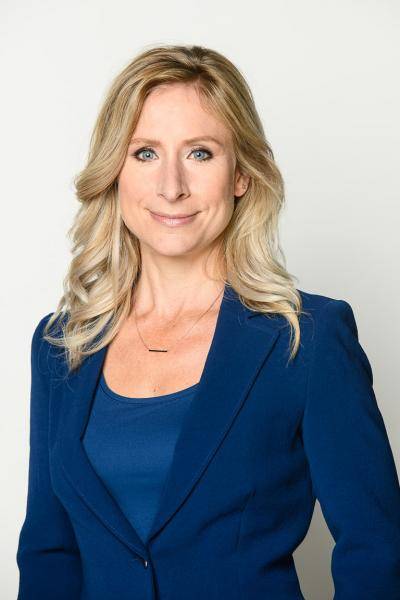Interviews
Meike de Jong: "You don't have to do it perfectly"
Newsreader Meike de Jong (1979) is best known for her television work, initially for Brabant Nieuws, and nowadays for RTL Nieuws. Yet that is only part of the story. As a presenter and chairperson, she ensures the proper management of international conferences. With English being the language of instruction, this places high demands on her language skills. This is where an STE language trainer could help.
How did you come across STE Languages?
"I live in Eindhoven and was looking for something nearby. I had heard many good stories about STE and it was immediately a match. They offer a lot of flexibility and that is exactly what I was looking for. I've been working with STE for five years now."
Why did you choose individual training?
"As I make irregular use of STE's services, when I have to prepare for an international conference, I seek the assistance of my language trainer, Melissa McGee. As a presenter and moderator, I have very specific needs, which invariably always require a tailor-made approach, and therefore, an individual training course suits this requirement the best."
What does such preparation entail?
"I often have different roles at a conference. As a chairperson, I receive the visitors and guide them through the program, and as an interviewer, I really go into the details. Each role requires different skills. This starts with the basics, such as how you can informally welcome people in a foreign language. To be able to have a substantive discussion, you also have to master the material. This then focuses more on vocabulary and about knowing and being able to use technical terms."
Can you give an example of that?
"I was recently the chairperson at a conference on e-mobility. The central issue was on how we can keep cities accessible in the future. You can only engage in the discussion if you know how legislation is developing and what trends and techniques are being used. For example, if you don't know what MaaS [Mobility As A Service, red.] means, how can you talk about it?"
Could you summarize the result of your language training?
"Language training is the ideal preparation for a conference for me. As a result, I have more confidence and feel comfortable in my role. My goal is to make it a fun day, animated and substantive. Due to my preparation, I know it will all work out."
Congresses often last a long time. How do you keep the audience engaged?
"Interaction with the public is important. Just make contact and ask a question, this helps the audience stay focused. A joke in between also helps. Sometimes I literally ask the audience if they are still with me and what they think of the energy in the room. Or I invite them to stand up and move around a bit. You have to ‘feel’ the audience and act on that accordingly."
How are things going during this coronavirus pandemic?
"We recently organised a conference on location but only used a film crew and a few guests. The audience participated online and submitted their questions via the chat. In this way we could experience the fun of a talk show and it ended up working out well. We also organised a show in a large factory but without an audience. This is more television work and that is a different form of presentation. There is less room for spontaneity; you have to get to the core of the topic quickly. As a result, a program is directly relevant in terms of content."
What is your general impression of STE?
"Very positive, especially for people who are active internationally. The tailor-made courses in particular, which focus on your specific requirements, are really great. It is a good place to improve your vocabulary and expression, so I wholeheartedly recommend them."
Finally, do you have any tips for other students?
"You often come across people who are not native speakers at conferences. English is therefore a foreign language for them too. That realisation has made me relax somewhat. My advice is to just have fun, even if things go wrong. In fact, that could help break the ice! You don't have to do it perfectly."
<< This is a contribution of STE Languages >>

